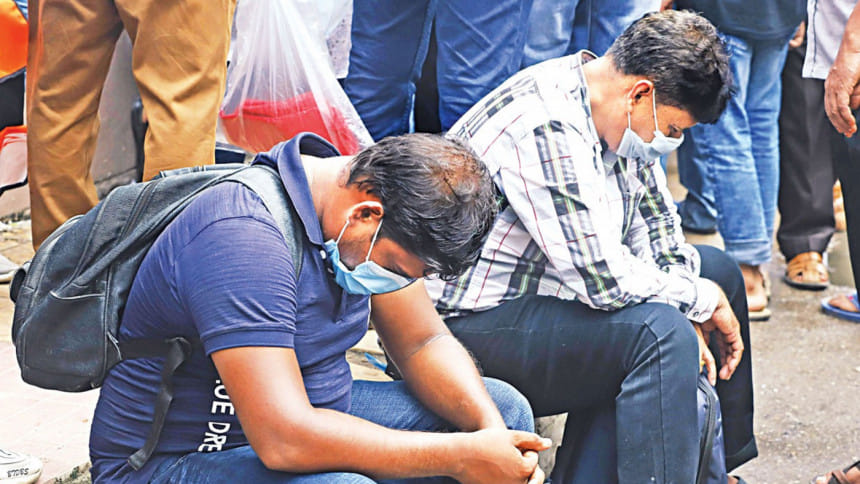Reintegration of Returnees: Little response to loan scheme

Shahidul Islam of Cumilla returned home on September 10 from Saudi Arabia after losing a restaurant job there.
Worried about his future, the 37-year-old was thinking of doing something to earn a decent living in the country as he saw no prospect of going back to the Gulf nation anytime soon.
Then a few weeks ago, he came to know about the "special reintegration loan" for the migrant workers. He then visited Probashi Kallyan Bank's branch office in Cumilla for the loan, only to get frustrated.
The bank officials told him that he could get a Tk 5 lakh loan only if he agrees to launch a trade. For this, he must have to submit papers of a property where he will run the business.
"I don't own such a property. I don't have enough capital to rent a store at this moment either," Shahidul said.
As he enquired about Tk 2 lakh loan for a dairy farm, the bank officials said he could get the loan for maximum one year.
"It means I have to repay about Tk 20,000 a month in instalment, which is impossible considering my present financial condition," he told The Daily Star by phone.
Shahidul is among the several hundred migrant workers who find some terms and conditions for getting the loan tough to fulfil. As a result, the government's initiative to provide the returnees with special loan for their economic reintegration saw poor response.
Rights activists said the four percent interest rate for a loan up to Tk 5 lakh is high considering the financial condition of the returnees, many of whom face risks of slipping into poverty.
Besides, the grace period against loan in most ventures is limited to one month only. Therefore, returnees have to start paying instalments almost immediately after taking the loan, they added.
"The four percent interest rate is high for the migrants who came home after losing almost everything and are in a disadvantaged situation now," migrant rights activist Prof CR Abrar told The Daily Star.
About 2.25 lakh migrant workers, including 25,436 women, returned between April 1 and October 24, according to expatriates' welfare ministry data. Most of them came home either after losing jobs or there was no prospect of a job in the host countries, it says.
RESPONSE FROM RETURNEES
The expatriates' welfare ministry created the Tk 200 crore special fund with money from Wage Earners' Welfare Board (WEWB). Probashi Kallyan Bank started disbursing loan from the fund from September 21, said bank officials.
The loan is being disbursed among the returnees who lost jobs, or the family members of migrants who died due to Covid-19, so they can start small ventures like cattle, fish, or poultry farming, dairy, small cottage, and small-scale trade.
In the first three weeks since its launch on September 21, a little over Tk 1 crore from the special fund has been disbursed. About 60 out of 400 applicants received the money while the rest of the applications were under process, according to Probashi Kallyan Bank.
Seeking anonymity, an official of the bank said about 8,000 returnees enquired about the special loan facilities. Bank officials provided them with counselling on different terms and conditions.
However, about half of them did not contact later, the official said.
Most returnees had no clear idea about what type of venture they want to start or where to invest the money, said the official.
After the Covid-19 pandemic hit the global economy early this year, many Bangladeshi migrants started returning home empty-handed after losing jobs.
Expatriate Welfare Minister Imran Ahmad after an inter-ministerial meeting on April 5 announced the decision of providing loan support to returning migrant workers for their reintegration.
On July 12, Probashi Kallyan Bank signed an agreement with WEWB under which the bank took Tk 200 crore from the board to create the fund.
The bank with the help of the ministry prepared the "Policy for reintegration loan for the Covid-19 affected migrant workers-2020" for the loan disbursement.
Later, some clauses were amended to "make the process easier" and allow more returnees, and an amended copy was published on September 17.
As per the new rules, migrants who returned home since January 1 are eligible for the loan. Earlier, returnees from March 1 were eligible only.
ONLY LOANS NOT ENOUGH
Prof CR Abrar said while the fund is one important element for returnee reintegration, it is also essential for them to have knowledge on various other things like financial literacy, training, and marketing.
"Returnee reintegration is a much more complex thing," said Prof Abrar, adding various services are required to ensure returnee reintegration.
Shariful Hasan, head of Brac Migration Programme, said, "Only giving loans to the poor returnees might not help them much."
He said many returnees had been in debt for long and without income for the past seven to eight months.
Their reintegration could be sustainable if initiative is taken on "need basis" and giving priority on their skills and their desire to do something, he added.
Contacted, Mahtab Zabin, managing director of Probashi Kallyan Bank, said they were making progress on the loan disbursement and that they would get a good result by December.
Pointing to lack of manpower, she said the bank has submitted requirements for additional manpower which is at the final stage.
"Once we get the manpower, we will be able to fulfil all targets swiftly," she said.

 For all latest news, follow The Daily Star's Google News channel.
For all latest news, follow The Daily Star's Google News channel. 




Comments